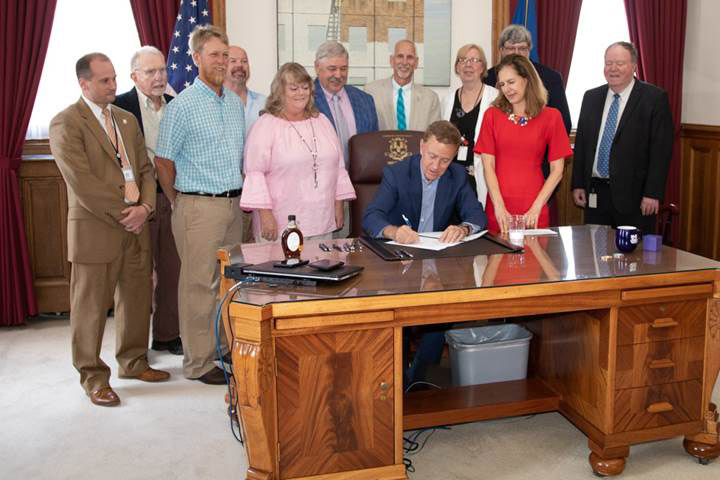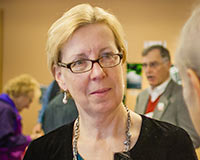Sen. Osten Welcomes New State Law to Help Connecticut Producers of Honey and Maple Syrup

State Senator Norm Needleman (D-Essex, back row, center) and John and Bonnie Hall of Maple Breeze Farm in Westbrook (to the left of Governor Lamont) look on as Gov. Lamont signs a new law making it easier for Connecticut farmers to sell the honey and maple syrup that they produce.
State Senator Cathy Osten (D-Sprague, fourth from right) looks on as Gov. Lamont signs a new law making it easier for Connecticut farmers to sell the honey and maple syrup that they produce. To the right of Sen. Osten, partially hidden, is Don Tuller, president of the Connecticut Farm Bureau Board of Directors.
HARTFORD – State Senator Cathy Osten (D-Sprague) was on hand today for the signing of a new state law that will make it easier and less-expensive for Connecticut farmers to sell the honey and maple syrup that they produce on their own land.
Sen. Osten joined Connecticut farmers in Governor Ned Lamont’s State Capitol office for the signing of Senate Bill 233, “AN ACT CONCERNING COTTAGE FOOD PRODUCTS AND THE PRODUCTION OF HONEY AND MAPLE SYRUP,” a bill that Sen. Osten co-sponsored which moves state oversight of those products from the state Department of Consumer Protection to the state Department of Agriculture.
The move means honey and maple syrup farmers in Connecticut will have both fewer regulations – and fewer potentially costly regulations – to adhere to when selling their products.
“There was never a good reason for regulating the production of honey and maple syrup because those products are not processed – they are ready to consume right after boiling or just off the honeycomb. These farmers know what they’re doing,” Sen. Osten said. “Cutting the red tape for syrup and honey farmers is good for Connecticut business and good for Connecticut consumers.”
Don Tuller, president of the Connecticut Farm Bureau Board of Director, said the new law will make a difference for Connecticut honey and maple syrup producers.
“It saves them time and money,” Tuller said. “The old regulations were really a little bit out of the DCP’s wheelhouse. They don’t understand on-farm conditions; they’re more suited to regulating commercial establishments like stores.”
Senate Bill 233 passed the Environment Committee on a unanimous and bipartisan vote in February, and was then passed by unanimous and bipartisan votes in both the state Senate and the House of Representatives.
The new law exempts all Connecticut maple syrup and honey production – including its preparation, packaging, labeling, and sale – from regulation under the state’s Food, Drug and Cosmetic Act (FDCA) and cottage food law, which the state Department of Consumer Protection oversees. The new law instead requires maple syrup and honey farmers to be licensed and inspected by the state Department of Agriculture. The new provisions take effect on October 1.
Share this page:
